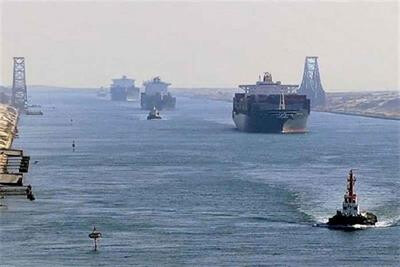
Suez, Egypt – Suez Canal Authority (SCA) Chairman Osama Rabie announced the completion of a two-and-a-half-year project aimed at enhancing the canal's navigational efficiency. In televised remarks, Rabie detailed the project, which included a 10-kilometer duplication of the canal, a 40-meter widening of the waterway in a specific zone, and a deepening to between 66 and 72 feet.
These improvements, Rabie stated, are expected to increase maritime traffic efficiency by approximately 28 percent, significantly boosting the canal's capacity. He emphasized that the project was completed despite global shipping crises and declining revenues, following President Abdel-Fattah El-Sisi's directives to push forward despite the challenges. Rabie highlighted that the entire project was carried out by Egyptian laborers using locally manufactured dredgers, and funded entirely in Egyptian pounds to support the local economy and avoid reliance on foreign currency and equipment rentals.
In a move aimed at maintaining competitiveness, Rabie affirmed that there would be no increase in Suez Canal transit fees this year. He explained that the development project itself is expected to enhance the canal’s global competitiveness, solidifying its role as a vital artery for international maritime trade. The project, he added, represents a “quantum leap,” attracting new classes of ships and marine units and increasing navigational safety for unconventional transit operations. The eastward expansion will also reduce pressure on vessels with large drafts.
Rabie also addressed the impact of recent Red Sea tensions on canal traffic. He expressed optimism that large vessels would gradually resume transits through the Red Sea by the end of March 2025, with a full resumption expected by mid-year, contingent on the stability of the Gaza truce and the absence of further attacks on shipping.
“All indicators suggest we are heading toward a calm state in the Red Sea region and the return of navigation,” Rabie said. However, he acknowledged that concerns remain, particularly following statements regarding the implementation of the second phase of the Gaza ceasefire deal. “I understand the concerns of large shipping companies, especially when a huge ship carrying crews and valuable goods passes,” he added.
Despite these concerns, Rabie pointed to several positive indicators, including the Houthis' announcement of halting offensive operations following the Gaza ceasefire agreement, and the recent successful transits of several US and UK ships, as well as the oil tanker Chrysalis, which transited despite being previously attacked.
Rabie acknowledged the significant financial impact of the Red Sea conflict on the Suez Canal, estimating losses of 61-62 percent of revenues, approximately $7 billion, in the fiscal year ending June 2025. He estimated total losses over the 15-month war at approximately $6.8 billion, potentially rising to $7 billion if the crisis continues. Daily ship traffic has dropped from 72-75 vessels to 30-32. The Houthi attacks have led over 10,500 ships to opt for the longer Cape of Good Hope route since November 2023. “All of these ships would have used the Suez Canal had the security threats not existed,” Rabie affirmed. He remains hopeful that with the improving security situation, traffic will return to normal, and the expanded canal will be able to handle increased volume efficiently.
[Copyright (c) Global Economic Times. All Rights Reserved.]




























